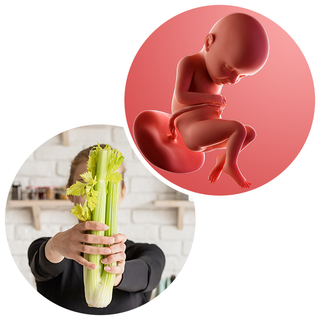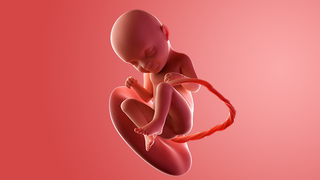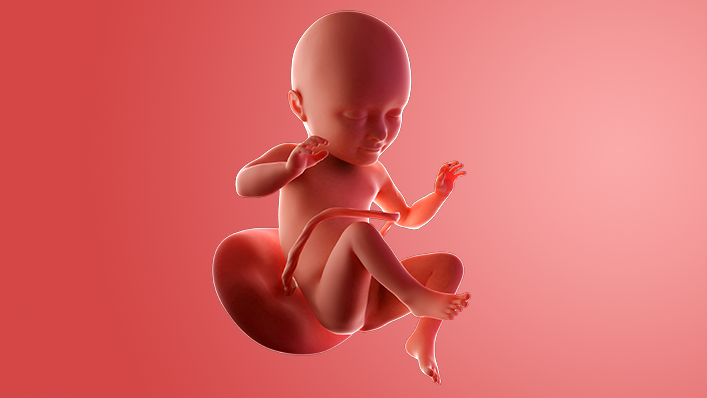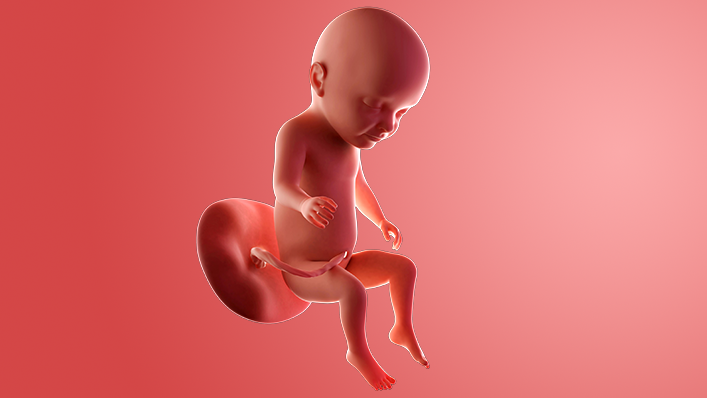What's happening in my body?
Over the next 4 weeks, you'll gain around 450g a week. Your baby will be putting on weight too, with around 1kg of extra fat.
The extra chubbiness will help your baby to stay at the right temperature after they're born. It's very easy for little bodies to get too hot or too cold.
Your baby is probably head down now, ready for birth ("cephalic presentation"). Try not to worry if this is not the case – there's still time.
However, if you get to around week 36 and your baby is not head down, your doctor or midwife might offer ways to encourage your baby to turn into position.
As your baby gets bigger, there will be less space in your womb. You should still feel movements, at the same rate, until you give birth.
If there are any changes to the patterns, or your baby stops moving, contact your midwife or hospital as soon as possible.
Whooping cough vaccination
Have you had the whooping cough vaccine? You should have it before week 33, you can have it later but your baby is less likely to get the protection from you. If you have not had the vaccine speak to your midwife or a GP this week.
Read more about whooping cough vaccination in pregnancy on NHS.UK.
Your choice of maternity service
You've probably got a good idea now about where you would like to give birth.
If you're having a planned caesarean section, find out how long you can expect to be in hospital so you can get prepared and make any arrangements you need, for instance care for your other children. The average hospital stay is 3 or 4 days.
Ask as many questions as you like and make sure you're confident with your choice. If you're not sure, you can change your mind.
Find out what other people think of your local NHS maternity services.
If you're worried about how coronavirus might impact your birth plan, visit the Royal College of Obstetricians and Gynaecologists for the most up-to-date advice.
Vitamin K
Within 24 hours of giving birth, you'll be asked if you would like your baby to have vitamin K, which is recommended by the Department of Health for all babies.
Vitamin K is important because it helps the blood to clot and can prevent a very rare condition called vitamin K deficiency bleeding, which can cause brain damage and even death. It is usually given as a jab in the thigh and is very safe.
It's your right to refuse the jab or ask for the vitamin to be given by mouth (orally) instead. Decide what is best for your baby and discuss it with your partner.
RSV vaccination
Have you had the RSV (respiratory syncytial virus) vaccine? It's usually offered at around week 28 but can be given later if needed, right up until you go into labour.
Having the vaccination can lower your baby's risk of a severe lung infection called bronchiolitis, which can make it difficult for your baby to breathe and feed. If you've not had it yet, speak to your midwife or a GP.
3rd trimester pregnancy symptoms (at 32 weeks)
You may be feeling more tired than usual. Try and take plenty of rests throughout the day.
Your signs of pregnancy could also include:
- sleeping problems (week 19 has information on feeling tired)
- stretch marks (week 17 has information on stretch marks)
- swollen and bleeding gums (week 13 has information on gum health during pregnancy)
- pains on the side of your baby bump, caused by your expanding womb ("round ligament pains")
- piles (week 22 has information on piles)
- headaches
- backache
- indigestion and heartburn (week 25 has information on digestive problems)
- bloating and constipation (week 10 has information on bloating)
- leg cramps (week 20 has information on how to deal with cramp)
- feeling hot
- dizziness
- swollen hands and feet
- urine infections
- vaginal infections (week 15 has information on vaginal health)
- darkened skin on your face or brown patches – this is known as chloasma or the "mask of pregnancy"
- greasier, spotty skin
- thicker and shinier hair
You may also experience symptoms from earlier weeks, such as:
- mood swings (week 8 has information on mood swings)
- morning sickness (week 6 has information on dealing with morning sickness)
- weird pregnancy cravings (week 5 has information on pregnancy cravings)
- a heightened sense of smell
- sore or leaky breasts (week 14 has information on breast pain) – a white milky pregnancy discharge from your vagina and light spotting (seek medical advice for any bleeding)
What does my baby look like?
Your baby, or foetus, is around 42.4cm long from head to heel. That's about the same length as a bunch of celery.
Your baby is perfectly formed but needs to put on weight – that's what the next few weeks are all about.

Action stations
Have you chosen a pushchair yet? If you're buying one second-hand, check the brakes work and that it's the right height for you.
You might also like to get a baby sling for the first few weeks. Babies love the close contact, and you will too.
Choose a carrier that will support your baby's head and check the straps are secure. Read some tips on what to buy on the NHS website.
This week you could also...
More in week-by-week

Week 33
As the weeks go by, you're probably feeling really tired now, which is not surprising.
More in week-by-week guide to pregnancy


